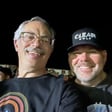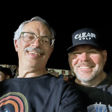
Tony Breaks the Ice with NHL Legend Marcel Dionne
This week, the Stanleu Cup playoffs are on and Tony gets the chance to talk hockey with the legendary Marcel Dionne. Dionne played 18 seasons in the National Hockey League for the Detroit Red Wings, Los Angeles Kings and New York Rangers between 1971 and 1989.
Follow the show on Twitter: @AAThingPodcast
Follow the show on Instagram: @andanotherthingpodcast
Follow Jodie Jenkins on Twitter: @jodie_a_jenkins
Follow Tony Clement on Twitter: @TonyclementCPC
Follow MNC Podcast Productions on Twitter: @MNCPodcasts
Find the show on the web: www.andanotherthingpodcast.ca
Check out some of our sponsors!
The Muskoka Chef - they offer catering throughout the Muskoka Lakes Region by car or by boat. Visit www.themuskokachef.com or call Julie at 416-846-3653.
Halton Government Relations -- opening the doors that will lead to your success.
This podcast is hosted by ZenCast.fm

